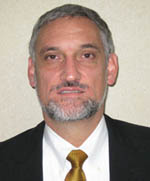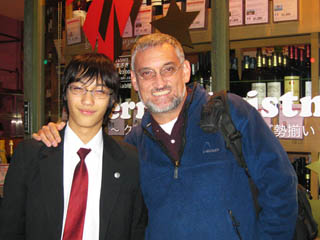
Steve Christie
Disclaimer: I am an LBP, or so called “Left-Behind Parent,” not that I ever wanted to be, nor do I even like the moniker. I do not feel “left behind!” I am right here! Here where I have been, where I was caring for my child as any loving parent does, until one day it all ended when my Japanese wife abducted my son and he disappeared from my life. How does one answer the question, “So, how is the family? How is your child?” when one doesn’t even know where the child is? I struggled to make sense of the new world I found myself in, and struggled, unsuccessfully, to get the Japanese police and Japanese courts to take appropriate action. I thought at that time, “I must be the only person in the world with this problem.”
And so I thought, until a couple of months later when I saw an article in a Tokyo magazine describing the case of Murray Wood, whose two children were abducted from Canada by their Japanese mother and kept in Japan in violation of a Canadian court order. The article described a symposium at the Canadian Embassy the month before about Japan’s refusal to accede to the Hague Convention on the Civil Aspects of International Parental Child Abduction, which requires expedient return of the children to the country of habitual habitation. Japan has had the convention “under study” for 30 years now. What more needs to be studied? Through contacting the writer of the story I was able to connect with other parents of children abducted to or within Japan who found themselves in a similar predicament. In fact the problem is so widespread that a documentary film, From the Shadows, is bringing the issue to the silver screen. Once I had contacted the filmmakers, then I really began to become aware of how pervasive this problem is in Japanese society. This is not just a foreigner/Japanese issue. As I visited various Japanese groups where Japanese citizens had lost their parental rights under the existing family law system in Japan, I learned that this is a much bigger domestic issue in Japanese society.
This realization first impressed me when I and the filmmakers attended a “Father’s Website” (www.fatherswebsite.com) conference in Nagoya. I was struck by how many Japanese parents there have been suffering from the same kind of needless loss as I and other foreigners are suffering – the loss of all contact with our beloved children. A presentation was made by a professor from Kobe about the adverse affects on the children. I then began researching the life-long adverse affects of “parental alienation syndrome” on the children who have been stripped of their rights to a meaningful relationship with both of their parents as mandated in the United Nations Convention on the Rights of the Child (UNCRC) of which Japan is a signatory. I learned of another documentary, Victims of Another War, which presents three case studies of adults who were abducted by one parent as children, and in their own words presents the anguish and pain they still endure even as adults.
After returning to Tokyo, I began to be introduced to the various Kanto-based groups of parents which are becoming organized to fight for change in Japan. Both domestic Japanese groups and international foreign groups are becoming coordinated and beginning to press the Japanese Diet for reform of the antiquated and dysfunctional family law system.
For the foreign groups the granddaddy has to be the Children’s Right Council Japan (www.crcjapan.com), which was the American children’s group’s first overseas chapter, the Japan branch founded by David Brian Thomas, who has not seen his son since his son was two. David stated in a Christmas interview in 2008 that he had not seen his son in over 15 years because the family of his wife refuses to allow any contact. The group is most active in the United States and holds candlelight vigils at the Japanese Embassy in Washington, D.C.
Another group which grew out of CRCJAPAN is the Children’s Rights Network Japan (www.crnjapan.net) which maintains a huge archive of data on children, parents, legal documents, INTERPOL warrants, as well as messages from left-behind parents to their children. The site run by “Mark Smith”1 is often cited in academic papers on the subject.
As for the Japanese nationals’ organizations, there has been a recent flurry of activity in groups starting and ending. The Father’s Websitegroup has been around for a number of years and is based in Nagoya. They are a good resource for books and information in Japanese about the issue, and books for children and adults. Another group which has chapters in both Eastern and Western Japan is Oyako Net. They have a very active group in the Kansai area which often joins events even in the Kanto region. Oyako Net has been very active working with politicians at the local and regional levels to institute resolutions calling on the central government to change the family law. In addition much lobbying effort has taken place in Tokyo with Diet members to enact joint custody laws. The Oyako Net in Kanto has been very active in this regard.
Another group which was an outgrowth of Oyako Net Kanto is the Kyodoshinken (joint custody) group or Knet for short. This group has been active in holding demonstrations in front of the Tokyo Family Court and passing out flyers to people going to and from the court. In addition, on a few occasions, they have actually met with representatives of the court to make their grievances known.

Steve Christie
There are many other groups, most of which can be linked to from the sites already mentioned. In addition, many group members have their own personal sites which can be found from these sites. What has struck me most is the sheer number of members in these groups who wish to see new family laws in Japan, laws which respect the rights of children to have a meaningful relationship with both of their parents, and respect the parental rights of the so-called “left-behind parent.” After all, these parents are still here, waiting and longing for the day they can be reunited with their children who were abducted from them. Let us hope change comes soon, so that the trauma caused these children, and these parents, will soon be over.
Steve Christie is a private American citizen whose 15-year-old son was abducted in October 2005. “American View” appreciates his willingness to share his personal experience, views, and insights in this article. This Christmas he received a special gift, being able to spend a little time with his son, the first time to be with his son on Christmas or birthday in 4 years! (photo)
1 In older papers, the Children’s Rights Network Japan site is cited as “www.crnjapan.com,” but that domain was taken over by the Children’s Resource Network, a site of unknown origin.







COMMENTS0
LEAVE A COMMENT
TOP